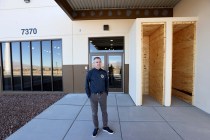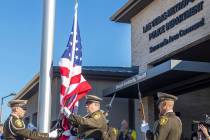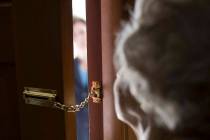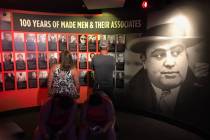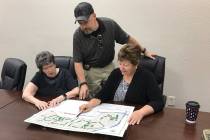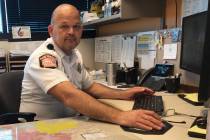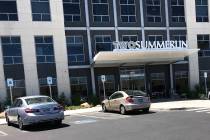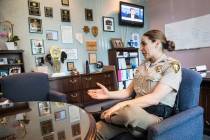Fire chief promises uncompromised service at new Sun City station
A well-intended purpose was linked to the invitation from Fire Chief Mike Myers to visit the downtown inner sanctum of Las Vegas Fire & Rescue. Some sound reasoning motivated him to open the door at 500 N. Casino Center Blvd. for a broad explanation of his department’s operations.
It involved a show-and-tell education dealing with fire and emergency life-saving equipment and procedures. That included a visit to the 911 control center, as well as enlightenment on the precision and coordination of this fascinating emergency system.
Myers led the hourlong, one-on-one tour that gave me insight into the intricacies of how firefighters save lives, ranging from battling fires to treating persons in need of life support. What many may not realize is that all firefighters are trained and certified in some of the most elaborate techniques of medical life support.
As the affable chief explained his reasoning, "I really need residents up there to understand this, especially those in Sun City."
In essence, Myers was saying he wants folks living in close proximity to Fire Station 107, which is nearing completion in Sun City Summerlin, to feel confident that firefighters are trained to save lives under all conditions. And that means responding to residents of Sun City and surrounding areas of Summerlin within minutes to the most critical needs.
"Immediate response is our biggest concern —- first and foremost," Myers exclaimed.
There was another reason for the chief’s interest in explaining how precious the minutes are from the call to 911, to the arrival of a fire and rescue vehicle, manned by a four-member crew trained in the essentials of life support. That’s because Fire Station 107, built to hold two vehicles, is expected to open in May with only one unit at the start, either a quint, an engine or a truck.
The reason is money. A rescue unit costs $350,000, but staffing that vehicle for 24 hours, 365 days a year, requires another $1.3 million. The cost of constructing, equipping and staffing Station 107 already is up to $6.3 million.
"Once we find the money, the station will have a rescue unit," Myers promised.
Still, it’s not the responding vehicle that’s capable of treating the patient. It’s the skills provided by that unit’s crew, coupled with the life-support equipment contained in the vehicle.
"If we get a call that someone may be in cardiac arrest, that’s the most critical call we can get," Myers said. "That’s when your heart stops and you’re not breathing. We have to be there within five minutes of the 911 call to start delivering life support.
"That crew is going to remain on the scene for 15 to 20 minutes, delivering the same quality of care you’ll get in any emergency room," he continued. Meanwhile, the rescue unit that eventually will transport the patient to a hospital will arrive about three minutes later.
"It’s the first few minutes of care by the four-member crew that’s most critical for the patient, not the means of transportation," Myers said. "That’s the key."
Myers produced a map detailing sites of the other 18 fire stations comprising Las Vegas Fire & Rescue. He pointed to five stations, numbers 47, 67, 44, 42 and 45, which are closest to the new station.
"Each of them has a rescue unit, and any of them would be available for transporting the patient to the hospital, after life support has begun," he said.
He explained that in cardiac arrest cases, where crews from his department were the first responders, "up to 60 percent of the cases we bring to the hospital will eventually walk out of that hospital. That’s almost unparalleled anywhere else in the U.S. There’s only a handful of communities across the country that are doing this as successfully as we do it here.
"And the reason we’re doing it is because of the way we staff our units, with the equipment we have and the level of training our people have received, which is extremely unique," Myers said proudly.
"We intend to put that same crew —- that four-person crew —- with that same training and the equipment they use, and with the same advanced life-support delivery, into the new station," he added.
Herb Jaffe was an op-ed columnist and investigative reporter for most of his 39 years at the Star-Ledger of Newark, N.J. His newest novel, "All For Nothing," is now available. Contact him at hjaffe@cox.net.



